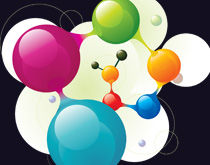
The youngster furrowed his brow while concentrating on the biology problem, his teacher encouraging him. Once the student figured out the correct answer, he developed more confidence and became intrigued with biology. Now a senior biological sciences major, Timothy Helbig says it's fulfilling to teach math part-time to elementary school students, as well as perform the research he's been involved with at Carnegie Mellon. "I started in biology because I had a really good high school biology teacher. I like to try to get people who are young hooked on math and science, too," he says.
Swati Varshney, a senior chemistry major, also was young when she became interested in science. One of her first teachers was her father, an electrical engineer. "He'd explain how things work," she remembers. Her interest in science continued at Carnegie Mellon. "I really like chemistry, because it explains how things work at a molecular level," she says. "I love setting up reactions, analyzing results, and having them mean something." She plans to pursue her passion for science through teaching and research in graduate school.
For chemical engineering senior Carmeline Dsilva, who finds time to serve as a student tutor and teaching assistant, she knows the next step in her career path. She wants to perform computational research in graduate school. "I hope to do something in density functional theory or in optimization research," she says.
The three students have something in common. They are among 278 college students nationwide to receive 2009 Barry Goldwater Scholarships, which aid students who plan to pursue research careers.
—Jonathan Barnes (HS'93)



